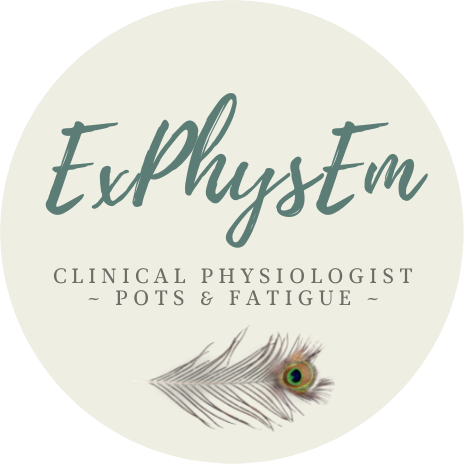You might notice two versions of this condition’s name and that’s because if you live in Australia or the US you would have heard it referred to as POTS, but if you live in the UK you would have heard the term PoTS. Lucky for me both the abbreviations are pronounced the same, but it’s important to clarify that both of these conditions are the same, the wording just changes between countries.
In adults, PoTS is diagnosed when an individual’s heart rate (HR) increases by 30bpm or more within 10mins of standing. This increase in HR lasts for 30 seconds or more and is accompanied by other PoTS symptoms including (but not limited to) dizziness, shortness of breath, nausea, shaking, sweating, and problems concentrating. Contrary to popular belief, this response also occurs without a sustained drop in blood pressure, although it is possible for people to have both PoTS and low blood pressure.
Understanding the physiology of PoTS can be tricky, even just getting your head around the above definition is enough to leave some people feeling brain foggy. This is why when I educate people in this area, I am sure to break it down in a way that makes sense to the individual, because it’s important for us to know what’s going on with our bodies so that we can build on this foundation with our management strategies. There are many ways to manage PoTS, but I will always tailor my treatment to your individual case, to make sure that we are being as specific as potsible – pun intended.
ME/CFS is a long-term condition that includes a large variety of symptoms but, as many of you reading this would already know, the most pronounced symptom is fatigue. Like many of the conditions that I treat, ME/CFS is a spectrum-based condition where people can present with mild, moderate, or severe cases, meaning this condition can impact each person's life differently.
Symptoms of ME/CFS can also fluctuate from day to day and are influenced by many factors within an individual’s life, and this is why it’s not only a challenging condition to live with, but also a challenge for many practitioners to treat effectively. Taking a patient led and emergent approach to treating chronic illness is absolutely key and especially important when it comes to the treatment of ME/CFS, because we are all so unique!
We are hearing more and more about Long COVID every day, but something that can be confusing in this rapidly changing field is the terminology used to describe this condition. Below is an overview of some of the most used definitions and where they originate from:
- Long COVID = COVID-19 symptoms that persist beyond ≥4wks of the acute infection, & these symptoms cannot be explained by an alternate diagnosis – National Institute for Health & Care Excellence (NICE)
- Post COVID-19 Condition = COVID-19 symptoms that are persisting long term, ≥12wks post onset, & these symptoms cannot be explained by an alternate diagnosis - World Health Organisation (WHO)
- Post-acute Sequalae of COVID-19 (PASC) = COVID-19 symptoms that are persisting long term, ≥12wks post onset, & these symptoms cannot be explained by an alternate diagnosis - (American medical experts)
These are not the only definitions circulating in the medical field and it’s important to note that these definitions can also be broken down further into sub-categories, but this gives a nice overview to address the most common terms.
Regardless of the name you use, symptoms of these conditions include (but are not limited to) fatigue, shortness of breath, problems with concentration and memory, insomnia, dizziness, heart palpitations, persistent pain, tinnitus, nausea, and IBS.
Like with all chronic health conditions, it’s important for individuals with Long COVID conditions to have thorough medical investigations to rule out other specific health concerns, and these tests often include blood tests, chest x-rays, blood pressure and heart rate monitoring. Once acute testing has been done and an individual is cleared, the next step involves a patient led approach for managing symptoms to improve overall capacity and quality of life.
The world is learning more about the ongoing impacts of COVID-19 with each day, however we do know that early intervention is key when it comes to managing long term conditions.




